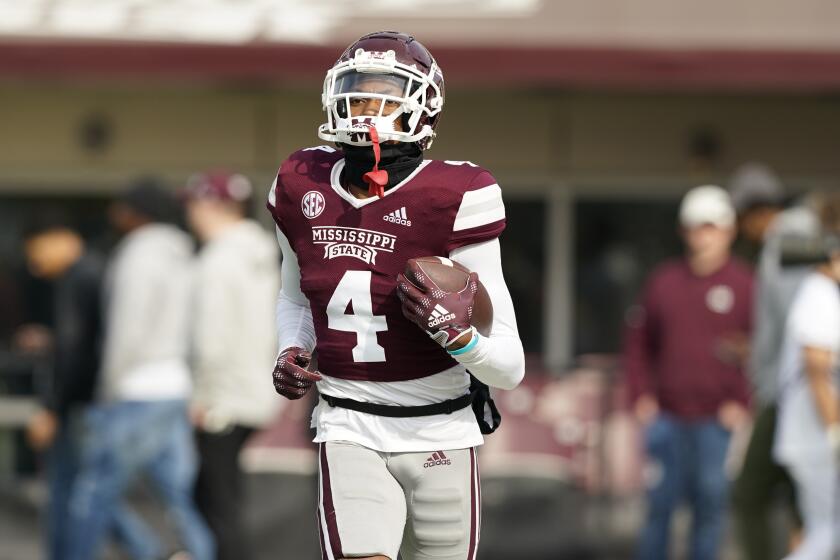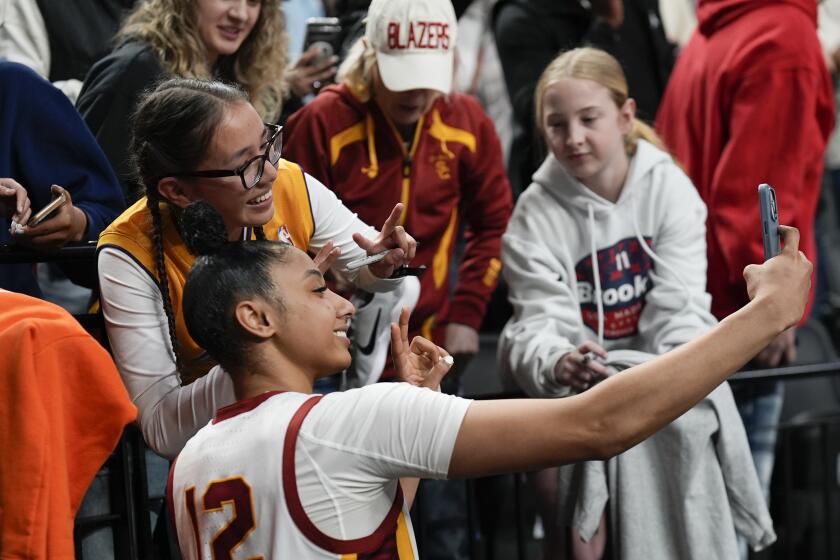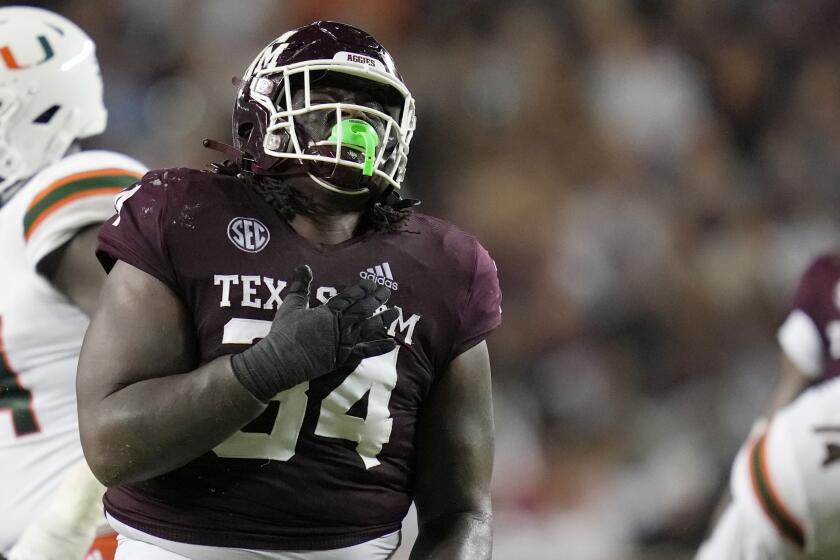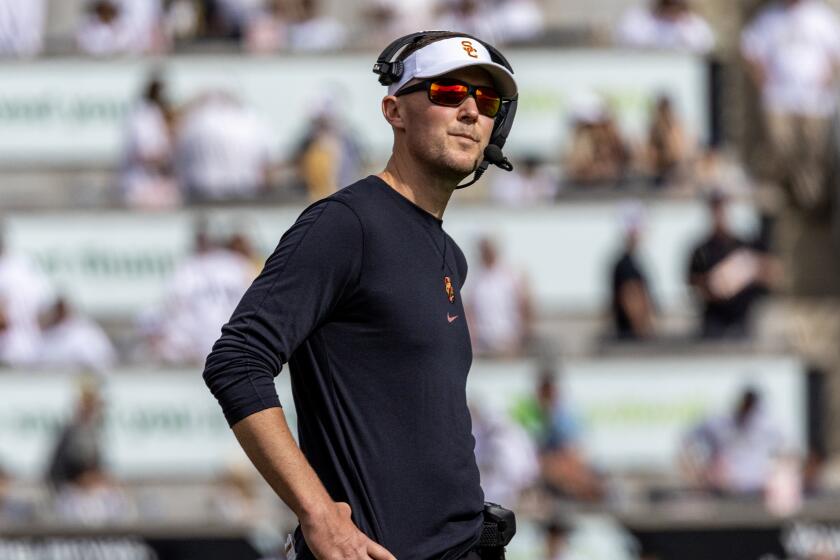A fine line separates USC and UCLA as they renew football rivalry
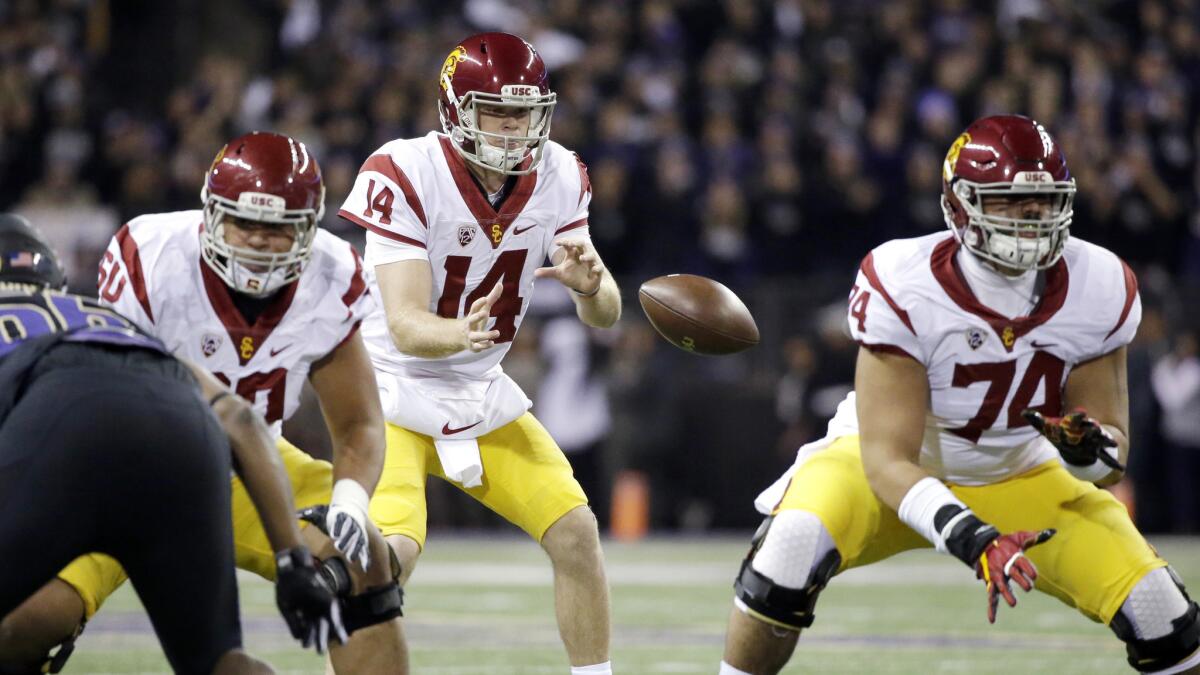
About two hours, 12 miles and a vast difference in the trajectories of a college football season separated two plays by USC and UCLA last month.
Early in the evening at the Coliseum, USC’s line paved a massive lane across Arizona State’s defensive front. Justin Davis galloped through and sliced his way into the end zone. One lineman, Chuma Edoga, marauded so far downfield that he almost tripped over Davis when the running back belly-flopped into the corner of the end zone.
When the sun dimmed shortly afterward, so had the optimism over at the Rose Bowl, where UCLA’s running game found futility against Arizona. On a second down and 16, Soso Jamabo tried a run to the right side. He was stuffed and tumbled onto the leg of right tackle Kolton Miller, who’d been a rare bright spot in UCLA’s anemic running game. Miller left the game and hasn’t played since.
If one evening could capture the essence of divergent seasons, it was this. UCLA, the team trying build a more physical brand of football, quite literally couldn’t get out of its own way. USC, a team that had lost three of its first four games, was finally running away from its painful start behind a resurgent line.
When USC (7-3 overall, 6-2 in Pac-12 Conference play) and UCLA (4-6, 2-5) renew their rivalry on Saturday at the Rose Bowl, the quarterback position will define the game in the eyes of many fans. Sam Darnold’s insertion into USC’s starting lineup has changed its fortunes dramatically. And Josh Rosen’s injury dealt UCLA a serious blow.
But the biggest difference between the teams and their results is not among the passers but who is protecting them.
USC’s offensive line has allowed the eighth-fewest sacks in the nation, and the Trojans are 19th in rushing yards per carry. UCLA is second to last in rushing.
And while USC is dreaming of a Rose Bowl, UCLA is dreaming of any bowl.
“They’re doing a really, really great job,” USC offensive coordinator Tee Martin said of his line.
The disparity wasn’t always this wide. Before the season, USC’s line was expected to rank among the best in the nation. But UCLA had reengineered its offense into a pro-style system to better match teams like Stanford. The Bruins had enough talent to be selected to finish first in the Pac-12 South by media members.
When the season began, it was USC that struggled most visibly. The line missed assignments and tripped over teammates in a 52-6 loss to Alabama. The Trojans mustered just 2.1 yards per rush and allowed three sacks.
After such a humbling, USC Coach Clay Helton said the line fully committed to improving. They watched more film and began taking pride in each repetition.
Since Darnold became the starter, a more balanced USC offense has rushed for an average of 237 yards per game.
“I knew that it was there,” Martin said. “It was just once we got some of the minor things that became big things out of the way, you knew you would see days like this.”
UCLA went in the opposite direction. The week after Miller’s injury, UCLA played Arizona State. The Bruins rushed for -1 yards and Rosen was knocked out for the season with a shoulder injury. They wouldn’t even crack 50 yards rushing in a game until four games later.
The running game’s decline put even more pressure on the Bruins’ backup quarterback, Mike Fafaul.
Fafaul threw 70 times in a game against Utah. He has thrown an average of nearly 47 passes per game, a pace that could continue on Saturday.
“I’ll just tell you this: whatever it takes to get ourselves in position to win the game, that’s what we’re going to try to do,” UCLA Coach Jim Mora said. “If that means we have to drop back and throw it 100 times, then that’s what we’ll do. If it means we have to run it 100 times, that’s what we do.”
The game is a must-win for each team, but for different reasons.
UCLA needs to win its final two games to guarantee bowl eligibility.
USC must win to stay alive in the Pac-12 South race. To capture the division, USC must defeat the Bruins, and Colorado and Utah must each lose at least once more.
Those teams play each other next week. That means if both lose this weekend, USC can clinch with a win. If both win, USC is out of contention. If they split, USC’s hopes could survive for another week.
“Whatever happens, Colorado loses or whatever, we’ve got to make sure that we’re focusing on UCLA,” running back Justin Davis said.
For some UCLA players, spoiling USC’s season would be the greatest prize in a disappointing season.
When November began, defensive lineman Takkarist McKinley said he would sacrifice a bowl game for a victory over the Trojans.
“Even if we go 1-3 these last games and beat ’SC, I think I’ll be good with that,” McKinley said.
Mora said he didn’t believe a win over USC would define a season. “I don’t want to think of life that way,” he said. “Every game’s important, so that’s how we look at it.”
His was the minority opinion. The importance of a win in Saturday’s game is the one thing players from both sides could agree on.
“You know, I want to say that we have to treat every game the same thing, but we all know in the back of our mind this is UCLA,” Davis, the USC running back, said. “This game means a whole lot, no matter what the records of each team are.”
Said UCLA linebacker Jayon Brown: “Getting a victory against those guys would be everything.”
Los Angeles Times staff writer Ben Bolch contributed to this article.
Follow Zach Helfand on Twitter @zhelfand
ALSO
A year later, Clay Helton reflects on the game that (maybe) won him the USC job
It will be speed versus strength when UCLA’s McKinley matches up against USC’s Wheeler, Banner
Go beyond the scoreboard
Get the latest on L.A.'s teams in the daily Sports Report newsletter.
You may occasionally receive promotional content from the Los Angeles Times.
